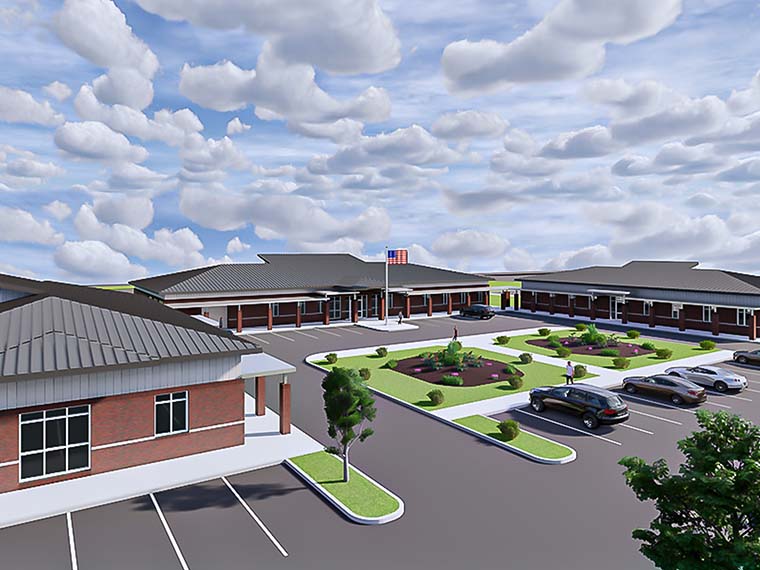The information presented on this page may be dated. It may refer to situations which have changed or people who are no longer affiliated with the university. It is archived as part of Mississippi State University's history.
MISSISSIPPI STATE has announced plans to build the Northern Gulf Aquatic Food Research Center - a $3 million facility funded through the state's RESTORE Act and the first of its kind on the coast providing seafood industry safety testing and quality assurance.
Dr. Wes Burger, associate director of the university's Mississippi Agricultural and Forestry Experiment Station, said the new analytical laboratory is part of a three-phase MSU project to help rebuild and strengthen the Northern Gulf region's seafood industry and economy.
"The Northern Gulf Aquatic Food Research Center is an opportunity for MSU and the Mississippi Agricultural and Forestry Experiment Station to play a key role in this revitalization, not just in Mississippi, but for the entire Northern Gulf region when it comes to aquatic food safety, processing, and product development. We seek to support the industry, see the natural resources restored, and bring consumers back to the table," Burger said.
He said that a number of natural and manmade catastrophic events in the Northern Gulf region over the last decade and a half, including Hurricane Katrina, the Deepwater Horizon oil spill and, most recently, the Bonnet Carré spillway diversion, have contributed to declines in the seafood industry and have had dramatic impacts on the coastal economy.
Scientists with the Mississippi Agricultural and Forestry Experiment Station and additional partners are working to ensure the region's reputation for high-quality seafood.
"Additionally, these events affect consumer perceptions about safety and quality of seafood coming out of the Northern Gulf. It's critically important that we have in place the resources and facilities to conduct real-time quality assurance for Gulf Coast seafood products so that consumers are confident in the food they are purchasing," Burger said.
A MAFES research unit, the new center will build effective teams of scientists from among the MSU system and other Northern Gulf region universities; federal entities including the Food and Drug Administration, National Oceanic and Atmospheric Administration, and Agricultural Research Service of the Department of Agriculture; state departments of Marine Resources and Health; and the private sector.
Intended to become a national and international center for the utilization of Northern Gulf seafoods, it also will help the state's catfish producers, who manage 36,300 freshwater pond acres, with a total production value of $172 million in 2019.
While MSU has had an experimental seafood processing lab on the coast for about 20 years, the new facility will allow MAFES to expand its footprint when it comes to helping the industry through improved seafood safety and quality testing and product research and development.
"Our current facility has some of the elements represented in the new Northern Gulf Aquatic Food Research Center but at a much smaller scale. The new center will allow for an expansion of these services into a lot of other areas," said Dr. James Henderson, professor and head of the university's Coastal Research and Extension Center located in Biloxi.
Current funding will provide for phase one, which includes construction of the facility that comprises a biosafety laboratory for pathogen and toxin testing and an analytical chemistry laboratory for measuring chemical residues in water and aquatic food products. Phase two will consist of a commercially-equipped pilot plant for processing and shelf life research and product development. Phase three includes incubator space to work in partnership with the industry to transfer technology, developed in the safety and pilot plants, to small businesses on the Gulf Coast.
"This center will give us the ability to provide rapid testing to ensure both seafood and water quality, giving assurance to consumers," Henderson said. "Previously, this type of testing has been exported outside of the state."
Henderson, who is overseeing the project, also noted that phase two will increase value-added processing capabilities for the state's fisheries.
"The center will help test and develop new value-added seafood products consumers desire - both in the U.S. and abroad - and create economic opportunity for both our existing fisheries and potential new industry," Henderson said. "As seafood processors look to expand or create new investments, Mississippi State will further help attract these enterprises by being here to assist them in quality assurance, testing, and development of new products."
For more information about the Northern Gulf Aquatic Food Research Center, contact James Henderson at j.henderson@msstate.edu.

